|
|
|
Sort Order |
|
|
|
Items / Page
|
|
|
|
|
|
|
| Srl | Item |
| 1 |
ID:
115674


|
|
|
|
|
| Publication |
2012.
|
| Summary/Abstract |
Green Building Councils (GBCs) have been established in many different countries in recent years. This paper discusses the role such organizations can play in the respective construction and real estate industry and under what circumstances a GBC can contribute positively to the development of a "greener" or "more sustainable" stock of buildings. The paper investigates the main informational problem of the industry by looking at the relation between a developer and an investor from an economic point of view. We argue that the investor's uncertainty about the true quality of a building and the corresponding incentive for the developer to cheat may lock them into a prisoners' dilemma trap. The corresponding barriers for a transition toward a "greener" buildings market are analyzed. GBCs are described as institutions of economic governance that can assist the economy in overcoming these problems. They can act as third party institutions in transactions between developers and investors. By certifying the quality of a building, they can reduce the risk for the investor to be cheated by the developer and also increase the incentive to develop good quality buildings for the developer. This task, however, raises some severe management challenges for the GBCs.
|
|
|
|
|
|
|
|
|
|
|
|
|
|
|
|
| 2 |
ID:
112546
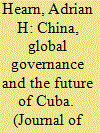

|
|
|
|
|
| Publication |
2012.
|
| Summary/Abstract |
China's deepening engagement with Latin America has been accompanied by concerns about the Chinese government's regard for international conventions of economic governance. Critics claim that across Latin America and the Caribbean, Chinese aid and trade are characterised by excessive state intervention. This article argues that, for two reasons, the rationale for these misgivings is dissipating. First, since the onset of the global financial crisis, China has gained influence in multilateral institutions, prompting them toward greater acceptance of public spending in developing countries. Second, recent developments in Cuba show that China is actively encouraging the Western hemisphere's only communist country to liberalise its economy. China sits at the crossroads of these local and global developments, prompting Cuba toward rapprochement with international norms even as it works to reform them.
|
|
|
|
|
|
|
|
|
|
|
|
|
|
|
|
| 3 |
ID:
158451
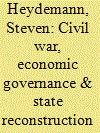

|
|
|
|
|
| Summary/Abstract |
Civil wars currently underway in Libya, Syria, and Yemen demonstrate that patterns of economic governance during violent conflict exhibit significant continuity with prewar practices, raising important questions along three lines. First, violent conflict may disrupt prewar practices less than is often assumed. Second, continuity in governance highlights the limits of state fragility frameworks for postconflict reconstruction that view violent conflict as creating space for institutional reform. Third, continuity of prewar governance practices has important implications for the relationship between sovereignty, governance, and conflict resolution. Civil wars in the Middle East have not created conditions conducive to reconceptualizing sovereignty or decoupling sovereignty and governance. Rather, parties to conflict compete to capture and monopolize the benefits that flow from international recognition. Under these conditions, civil wars in the Middle East will not yield easily to negotiated solutions. Moreover, to the extent that wartime economic orders reflect deeply institutionalized norms and practices, postconflict conditions will limit possibilities for interventions defined in terms of overcoming state fragility.
|
|
|
|
|
|
|
|
|
|
|
|
|
|
|
|
| 4 |
ID:
090292


|
|
|
| 5 |
ID:
120229


|
|
|
|
|
| Publication |
2013.
|
| Summary/Abstract |
In studying the policy responses to economic crises in ASEAN and the EU, this paper addresses three issues: the financial crisis of 1997-98 in Southeast Asia, and the European Union's financial crisis of 2008 followed by the sovereign debt crisis; policy adjustment actions in both regions in the area of economic coordination; and areas of mutual policy inspiration for both regions.
Both crises studied were regionally risk-intensive. However, their natures were different. The Asian crisis was mainly externally driven by capital flows, while the EU one - especially the sovereign debt part of it - was predominantly of an internal nature due to imbalances in the euro area and a worsening of the situation in public finances in some euro members. On top of it, the pre-crisis economic governance structure differed with a light one in ASEAN and a deeper one in the EU; however, economic policy was still based dominantly on coordination.
The policy adjustment corresponds to the nature of the crisis and original governance structures. In ASEAN, it is characterized somewhat both by a deepening of regional cooperation and a widening of risk-pooling beyond the borders of the region (ASEAN Plus). On the EU side, the policy response privileges a strong deepening of policy cooperation coupled with more narrow-looking geographical coverage.
The crises offer a unique window for policy adjustment. ASEAN could consider: deepening multi-lateralization in the single market; a gradual and low-intensity monetary cooperation; and enhancing its institutional capacity. The EU can, on its side, fully implement its new rules and put them under the EU-27 roof. It can go beyond this and consider a broader economic partnership with some of the new instruments with the EFTA countries. Finally, it can also reflect on the ASEAN success with the enlargement of its regional influence - how to strengthen its leadership in its closest neighbourhood (Balkans, North Africa, Eastern Partnership) by ensuring an area of stability and prosperity.
|
|
|
|
|
|
|
|
|
|
|
|
|
|
|
|
| 6 |
ID:
111025
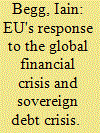

|
|
|
|
|
| Publication |
2012.
|
| Summary/Abstract |
Since the sovereign crisis erupted in the autumn of 2009 when the true scale of the Greek fiscal deficit was revealed, the European Union (EU), and especially the euro area, has staggered from crisis to crisis. Major initiatives have, however, been taken to improve economic governance and to put in place a more resilient framework for the euro. This article assesses how the EU has responded to the crisis and offers explanations for why the reform process has been slow and indecisive. It shows that potentially enduring solutions are on the table, but that they have been hard to introduce because of differing national perspectives and disagreements about how the burdens of adjustment should be shared. The article concludes by setting out plausible options and explaining what they entail.
|
|
|
|
|
|
|
|
|
|
|
|
|
|
|
|
| 7 |
ID:
100328
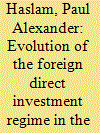

|
|
|
|
|
| Publication |
2010.
|
| Summary/Abstract |
The purpose of this article is to describe the international regime governing foreign direct investment in the Americas and assess its implications for regional economic governance. The article develops a novel methodology to map the multi-layered patchwork of investment agreements according to the level of investment protection offered by each agreement. The mapping exercise demonstrates the existence of two distinct legalization projects in the Americas, one which broadly corresponds to the investment protection concerns of the United States, and a second, overlapping regime, which better reflects the interest of many Latin American governments in maintaining their policy autonomy. The article argues that these distinct visions are anchored in a common dispute settlement system based on binding international arbitration, which tends to harmonize the governance effects of the regime.
|
|
|
|
|
|
|
|
|
|
|
|
|
|
|
|
| 8 |
ID:
088771
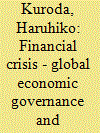

|
|
|
| 9 |
ID:
128321
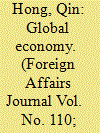

|
|
|
|
|
| Publication |
2013.
|
| Summary/Abstract |
The year 2013 continues to witness profound and complex changes in the international economic landscape. The underlying impact of the international financial crisis remains, and the recovery of the global economy is unstable, unsustainable and uneven. China has maintained steady economic growth through vigorous reform, and actively participated in global economic governance, making important contribution to global growth.
|
|
|
|
|
|
|
|
|
|
|
|
|
|
|
|
| 10 |
ID:
186173
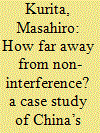

|
|
|
|
|
| Summary/Abstract |
China has been gradually shifting away from its traditional non-interference approach in development initiatives. This is particularly notable in the implementation of the China–Pakistan Economic Corridor (CPEC), a mega-development scheme that China is advancing in Pakistan. In this case, China’s aid and investment entail extensive interference in Pakistan’s internal affairs, forcing Pakistan to alter policies, regulations, and institutional arrangements over its political and economic governance, along with directly engaging with non-governmental actors in the country. Such acts of interference are largely orientated toward centralizing the decision-making and execution process in Pakistan over the CPEC, thereby facilitating its implementation in a manner profitable for Chinese stakeholders. This approach can be regarded as China’s promotion of autocracy in a ‘pragmatic’ way.
|
|
|
|
|
|
|
|
|
|
|
|
|
|
|
|
| 11 |
ID:
129972


|
|
|
|
|
| Publication |
2014.
|
| Summary/Abstract |
In the post-Lisbon era and especially since the outburst of the financial and European sovereign debt crisis, the EU has been changing significantly, to the extent that the meaning and the process of integration are being affected. While constitutional asymmetry is a longstanding feature of the EU polity, the real challenge today is the expanding scope and fragmented character of newly established forms of flexibility, and how they are being used politically. The flexible configuration of integration reinforces a trend toward fragmented integration. Flexibility within the EU could become an end in itself, a device to serve a wide range of strategic visions and preferences in sectoral politics.
|
|
|
|
|
|
|
|
|
|
|
|
|
|
|
|
| 12 |
ID:
173795
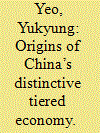

|
|
|
|
|
| Summary/Abstract |
In this study, I analyse the historical origins of China’s distinctive tiered economy by employing the analytic framework of a complex adaptive system to examine how the process of change involves selection, interaction among elements, and variation in types, which ultimately lead to adaptation. I argue that the rise of China’s tiered economy can be traced back to the Mao era and that it was enhanced throughout Deng’s economic reforms. To elaborate on this argument, I first describe how Mao’s invisible hand planted the seeds of the tiered economy. Selection at the strategy level and the resulting variation are examined as Mao’s adaptive tactics for nurturing the industrial sector. This mechanism of selection was also maintained to partially embrace market forces in Deng’s early era of reform. I then closely examine how Deng’s vision of the socialist market economy provided the party-state with raw materials for adaptation, deepening its tiered economy.
|
|
|
|
|
|
|
|
|
|
|
|
|
|
|
|
| 13 |
ID:
096359
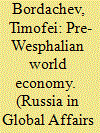

|
|
|
| 14 |
ID:
116364


|
|
|
|
|
| Publication |
2012.
|
| Summary/Abstract |
This article concerns itself with the agenda, the instruments, and the goals of public diplomacy (PD). Taking into account the current state of PD that concentrates predominantly on forging cultural and educational links and promoting values, but not policies, it refocuses PD in two substantial ways: driving it, first, to focus on the most significant global issues and, second, to employ profound discursive processes. The emphasis then shifts to how PD can strengthen the global public sphere with regard to the profoundly political and critical issues of the present era. It argues in favour of strategic discursive PD and suggests ways to enhance both the legitimacy and efficiency of states' foreign policies on the handling of the Greek economic crisis and the issue of economic governance.
|
|
|
|
|
|
|
|
|
|
|
|
|
|
|
|
| 15 |
ID:
092159
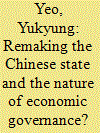

|
|
|
|
|
| Publication |
2009.
|
| Summary/Abstract |
This report explains the shifts and strains in the 2008 super-ministry government reform, focusing on the reform of government institutions of economic governance. Drawing on interviews with officials and scholars in Beijing after the reform, and on Chinese-language reports and books, this study suggests that the key to substantial progress in remaking the Chinese state into a macroeconomic regulator is the reform of the National Development and Reform Commission (NDRC), which was lacking in the 2008 scheme. Its powerful authority for investment endorsement is particularly problematic. A continued administrative malaise in the energy sector and strategically articulated state engagement in industrial development also should be noted as the salient features of China's economic governance.
|
|
|
|
|
|
|
|
|
|
|
|
|
|
|
|
| 16 |
ID:
160612


|
|
|
|
|
| Summary/Abstract |
The ‘Indo-Pacific’ has emerged as the newest addition to the lexicon of Asian regionalism. Conceived of as the conjunction of the Pacific and Indian Oceans, it reflects the belief that maritime linkages require extending Asian regionalism westwards to include countries on the Indian Ocean rim. It also competes with the longstanding ‘Asia-Pacific’ conceptualisation of the region, and four governments—Australia, India, Japan and the USA—have adopted it into their foreign policies. Much of the debate on the Indo-Pacific focusses on how it institutionally ‘rescales’ Asian regionalism through the incorporation of Indian Ocean states. This article considers the functional rescaling that attends this process: namely, what kind of regionalism is implied by the Indo-Pacific concept? It argues that the Indo-Pacific is a security-focussed regional project, reflecting the desire of its proponents to form a quadrilateral bloc to resist China’s growing maritime assertiveness. This security region is radically different from the Asia-Pacific concept, where regionalism was primarily driven by economic integration and cooperation. The Indo-Pacific thus marks a more contested period in Asia’s international politics, where the functional purpose of regional cooperation is being reoriented from economic- to security-focussed agendas.
|
|
|
|
|
|
|
|
|
|
|
|
|
|
|
|
| 17 |
ID:
121754
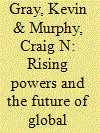

|
|
|
|
|
| Publication |
2013.
|
| Summary/Abstract |
There has been much debate over the extent to which the rising powers of the global South are challenging contemporary global political and economic governance. While some observers see an emancipatory potential in the redistribution of power among states, others see the rising powers as firmly located within the Western-centred neoliberal world order. This collection of papers seeks to go beyond the state-centrism of existing approaches by examining how challenges to global governance by rising powers are rooted in specific state-society configurations. Through studies of Brazil, India, China and other important developing countries within their respective regions, such as Turkey and South Africa, the papers examine the way domestic structures, arrangements, actors and dynamics influence the nature of the international interventions and behaviour of rising powers. They ask how their increased political and economic enmeshment in the international system impacts upon their own internal societal cohesion and development. By examining these issues, the papers raise the question of whether the challenge posed by the rising powers to global governance is likely to lead to an increase in democracy and social justice for the majority of the world's peoples.
|
|
|
|
|
|
|
|
|
|
|
|
|
|
|
|
| 18 |
ID:
110114


|
|
|
|
|
| Publication |
2012.
|
| Summary/Abstract |
A trend setter in Asia up to the sixties, economic management in Pakistan has steadily
deteriorated to the point where the economy has, for the past few decades, lurched
from one financial crisis to the next. At the heart of the problem has been the poor
management of public finances and deep-seated unresolved structural issues in the
economy that bad management and poor governance has exacerbated. The consequences of this secular decline in economic governance are plain to see: macroeconomic instability, high inflation, poor public services, criminal neglect of the social sectors, widespread corruption, crippling power outages, growing unemployment, deepening poverty and a deteriorating debt profile.
2
|
|
|
|
|
|
|
|
|
|
|
|
|
|
|
|
| 19 |
ID:
128268
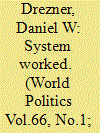

|
|
|
|
|
| Publication |
2014.
|
| Summary/Abstract |
Prior to 2008, numerous international relations scholars had predicted a looming crisis in global economic governance. Policy analysts have only reinforced this perception since the financial crisis, declaring that we live in a "G-Zero" world. This article takes a closer look at the global response to the financial crisis and reveals a more optimistic picture. Despite initial shocks that were more severe than the 1929 financial crisis, global economic governance structures responded quickly and robustly. Whether one measures results by outcomes, outputs, or process, formal and informal governance structures displayed surprising resiliency. Multilateral economic institutions performed well in crisis situations to reinforce open economic policies, especially in contrast to the 1930s. While there are areas where governance has either faltered or failed, on the whole, the system has worked. Misperceptions about global economic governance persist because the Great Recession has disproportionately affected the core economies; analysts have conflated national with global governance; and the efficacy of past periods of global economic governance has been badly overestimated. Why the system has worked better than expected remains an open question, but we can tentatively conclude that both the power of the United States and the resilience of neoliberal economic ideas were underestimated.
|
|
|
|
|
|
|
|
|
|
|
|
|
|
|
|
| 20 |
ID:
092992
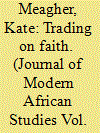

|
|
|
|
|
| Publication |
2009.
|
| Summary/Abstract |
The pressures of economic crisis and reform that have gripped African societies have been accompanied by a proliferation of new religious movements. Amid concerns about the political impact of religious revivalism, little attention has been devoted to their economic implications. Focusing on the remarkable coincidence between the withdrawal of the state, the rise of religious movements, and the dramatic expansion of the informal economy, this paper examines the role of religious revivalism in processes of informal economic governance and class formation in contemporary Africa. Against the background of the historical role of religion in the development of market institutions across the continent, it traces the dynamics of religious revivalism and informal economic regulation in two regions of Nigeria. Rather than representing a return to occultist or patrimonial impulses, new religious movements reveal distinctly Weberian tendencies. However, modernising tendencies fostered within the informal economy by popular religious revivalism are being stunted by the relentless pressures of liberalisation, globalisation and pseudo-democratisation. Progressive religious tendencies among the poor are being instrumentalised by religious entrepreneurs and political elites, undermining fragile processes of entrepreneurial class formation taking place within the informal economy.
|
|
|
|
|
|
|
|
|
|
|
|
|
|
|
|
|
|
|
|
|